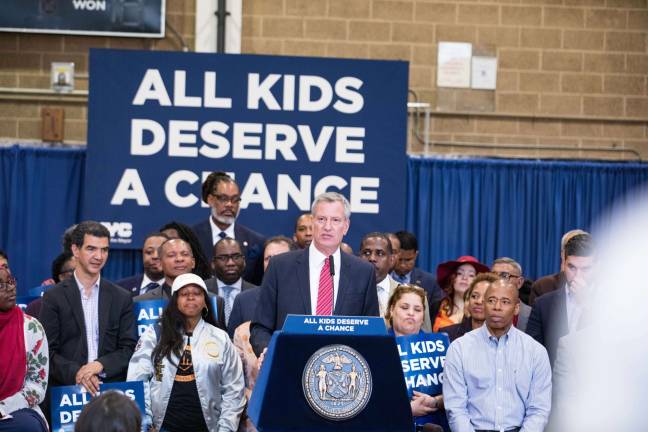Mayor's school Desegregation push continues

In a bid to increase diversity at the city’s top public high schools, Mayor Bill de Blasio wants to jettison a high-stakes single-exam entrance system that some have suggested works to exclude black and Latino students.
Eight of the city’s nine elite specialized high schools — among the most competitive and prestigious public schools in the country — determine which students receive coveted offers of admission based on a single factor: scores on the Specialized High School Admissions Test, a three-hour standardized exam that all applicants must take.
The single-test system, mandated since 1971 under state law, has produced a student body at specialized high schools that bears little resemblance to the demographics of the public school system as a whole. Black or Latino students make up 70 percent of New York City’s public school population, but comprise just 10 percent of the student body at specialized high schools. At Stuyvesant High School, the incoming freshman class of more than 900 includes just 10 black students.
“Basically for thousands and thousands of students and neighborhoods all over New York City, the message has been these specialized schools aren’t for you,” de Blasio said at a June 3 press conference in Brooklyn announcing the proposal.
The city aims to begin addressing the disparity immediately by expanding an initiative known as the Discovery program that provides a path to admission at specialized high schools for low-income students who score just below the cutoff score on the admissions test. According to Department of Education projections, the expansion would boost the proportion of specialized high school admissions offers to black and Latino students from nine to 16 percent.
The second, and potentially more impactful aspect of de Blasio’s two-part proposal calls for the wholesale elimination of the Specialized High School Admissions Test, a step that would require action from the state Legislature. Under the plan, the single-test criterion would be phased out over three years and replaced with a new admissions metric evaluating students based on course grades and state standardized test scores.
Currently, students from a handful of top middle schools account for an inordinate number of offers to specialized high schools. The mayor’s plan would extend offers to the top 7 percent of students from each middle school in the city. Ultimately, full implementation of the plan would result in 45 percent of offers going to black and Latino students, the city projects, as compared to 9 percent currently.
The mayor invoked the example of admissions to elite universities in making his case for the unfairness of single test admissions, a system in which some students have the resources to afford expensive test preparation books and classes and others do not, saying, “there is no great college in America that chooses its students based on a single standardized test”
“It doesn’t matter if you’re having a good day, a bad day, if you’re sick, if you’re not sick,” de Blasio said. “You get one shot only for three hours that determines your future. Nothing could be more insane than that.”
Legislation to end the test has been introduced in Albany, but its prospects in the current legislative session, which ends this month, are unclear. Though some legal experts believe that under state law the city could immediately eliminate the Specialized High School Admissions Test in five of the eight specialized high schools that use it, de Blasio explained that his administration is of the opinion that “the law right now isn’t clear on this issue and the best way to win is to go change the law.”
Two of the schools that would be impacted by the plan are in Manhattan: Stuyvesant High School in Battery Park City and High School for Math, Science and Engineering in Hamilton Heights. (The borough’s third specialized high school, LaGuardia High School on the Upper West Side, does not use the test and would not be impacted by the changes.)
The plan to bolster diversity in the city’s highest-profile public schools is the latest effort in a broader push to end segregation in the New York City school system, which is among the most segregated in the nation.
Schools Chancellor Richard Carranza, who took office in April, has criticized admissions screening in public schools and took an early and visible role in championing a plan to increase diversity in Upper West Side middle schools. Carranza drew on his experience as a teacher in critiquing the current single-test admissions model at the June 3 press conference, saying, “very often the students with the grit, the students with the tenacity, the students with leadership skills weren’t always my best test-takers, yet when given the opportunity to demonstrate those skills, when given the opportunity to actually act and be the leaders that they could be, they blossomed.”
The announcement was met with opposition from several specialized high school alumni groups as well as some Asian students (who along with whites receive an outsized proportion of admissions offers to specialized high school), but a number of education groups and local elected leaders voiced support for the mayor’s initiative.
Helen Rosenthal, who has been a vocal proponent of ending public school segregation in the Upper West Side district she represents in the City Council, praised the mayor’s effort in an emailed statement, saying, “There will never be equality of opportunity for every New York City child as long as admissions criteria are based on one test alone, when privately paid test prep is pervasive among families who can afford it. The current system only reinforces the deep socio-economic disparities that exist in our society.”